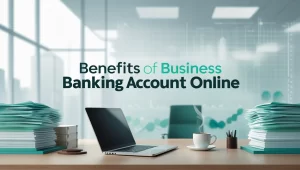Understanding Business Bank Account Fees: What You Need to Know

Understanding Business Bank Account Fees: What You Need to Know-Navigating the world of business banking can feel like a daunting task, especially when it comes to understanding the various fees associated with business bank accounts. As an entrepreneur, every penny counts, and being informed about these fees can save you money in the long run. This friendly guide will help you understand the ins and outs of business bank account fees, so you can make the best financial decisions for your venture.
The Importance of Knowing Fees

Before diving into the specifics, it’s essential to recognize why understanding business bank account fees matters. For startups and small businesses, hidden charges can quickly accumulate, impacting your cash flow and profitability. By being aware of these fees, you can avoid surprises and choose an account that aligns with your financial strategy.
Common Types of Business Bank Account Fees
Business bank accounts come with a variety of fees. Here are some of the most common ones you should be aware of:
1. Monthly Maintenance Fees
Many banks charge a monthly maintenance fee for business accounts. This fee can range from a few dollars to over $20, depending on the institution and the type of account you choose. (Read More: Inflation falls in Canada in Jun 2024; the Federal Reserve sees some progress on inflation but envisions only one rate cut this year)
To potentially avoid this fee, look for banks that offer:
- No-Fee Accounts: Some banks provide business accounts with no monthly maintenance fee, especially for startups or small businesses.
- Minimum Balance Requirements: Many banks will waive the monthly fee if you maintain a minimum balance. Make sure to check what this amount is and whether it’s feasible for your business.
2. Transaction Fees
Every time you make a deposit or withdrawal, you might incur transaction fees. This is particularly important to consider if your business has a high volume of transactions.
Key points to keep in mind:
- Limit on Free Transactions: Some banks offer a certain number of free transactions each month, after which fees kick in. Familiarize yourself with these limits.
- Charges for Different Types of Transactions: Be aware that different transactions—such as wire transfers, ACH payments, or even writing checks—might come with varying fees.
3. ATM Fees
Using ATMs outside your bank’s network can lead to additional charges. These fees can quickly add up, especially if your business relies on cash transactions.
To avoid these fees:
- Find a Bank with a Large Network: Look for banks that offer access to a wide range of ATMs, ideally with no fees.
- Consider Refunds: Some banks will reimburse you for ATM fees incurred at other locations, which can save you money in the long run.
4. Overdraft Fees
Accidentally overdrawing your account can lead to hefty overdraft fees. These fees can be particularly burdensome for businesses that experience cash flow fluctuations. (Read More: Bank of Canada warns of low productivity ‘emergency’ making it harder to control inflation)
To minimize overdraft risks:
- Set Up Alerts: Many banks offer transaction alerts that can notify you when your balance is low.
- Link Accounts: Some banks allow you to link your business account to a savings account or credit line to cover overdrafts automatically.
5. Wire Transfer Fees

If your business regularly sends or receives money through wire transfers, be aware that these transactions often come with fees. Domestic transfers usually have a lower fee than international ones, but they can still be significant.
To manage wire transfer fees:
- Choose a Bank with Competitive Rates: Some banks offer lower fees for wire transfers, particularly for business accounts.
- Consider Alternatives: If your business frequently uses wire transfers, explore other payment methods that might be more cost-effective.
6. Merchant Service Fees
If your business accepts credit card payments, you may encounter merchant service fees. These fees can vary widely based on the payment processor you choose. (Read More: AI is coming for banking before any other kinds of jobs, Citigroup warns)
Consider the following:
- Understand the Fee Structure: Some processors charge a flat fee, while others take a percentage of each transaction. Familiarize yourself with these structures to choose the best option for your business.
- Look for Bundled Services: Some banks offer merchant services as part of their business banking packages, which can save you money.
How to Choose the Right Business Bank Account

Now that you have a clearer understanding of business bank account fees, how do you choose the right one for your needs?
- Assess Your Business Needs: Consider the nature of your business. Do you have high transaction volumes? Will you be using ATMs frequently? Understanding your needs will help you identify which fees will impact you the most.
- Compare Different Banks: Take the time to research and compare various banks and their fee structures. Some may offer better rates for your specific business activities.
- Read the Fine Print: Before opening an account, carefully review the terms and conditions. This will help you avoid unexpected fees and ensure that you understand all the costs associated with your account.
- Ask Questions: Don’t hesitate to reach out to the bank’s customer service with any questions about fees or account features. A bank that values its customers will be happy to provide clear answers.
Conclusion article Understanding Business Bank Account Fees: What You Need to Know
Understanding business bank account fees is essential for any entrepreneur looking to manage their finances effectively. By being aware of the different types of fees, you can make informed decisions that benefit your bottom line.
Take the time to research and compare options, ensuring that the account you choose aligns with your business needs and goals. With the right business bank account, you’ll be well-equipped to navigate the financial landscape and focus on growing your venture. Happy banking!





